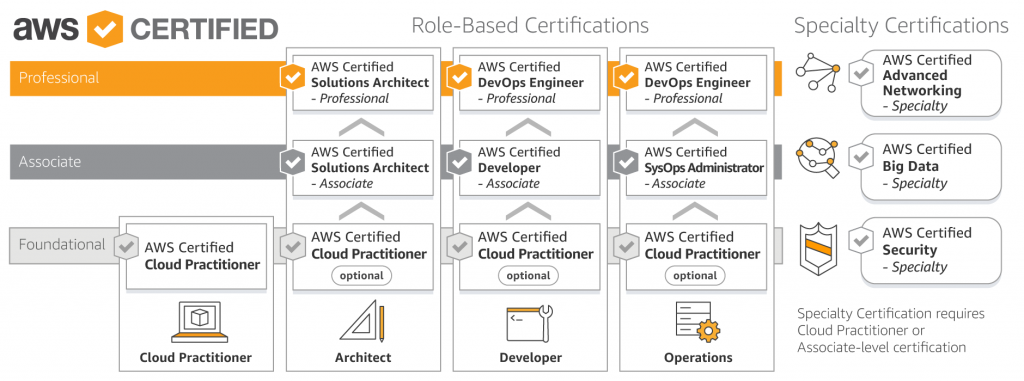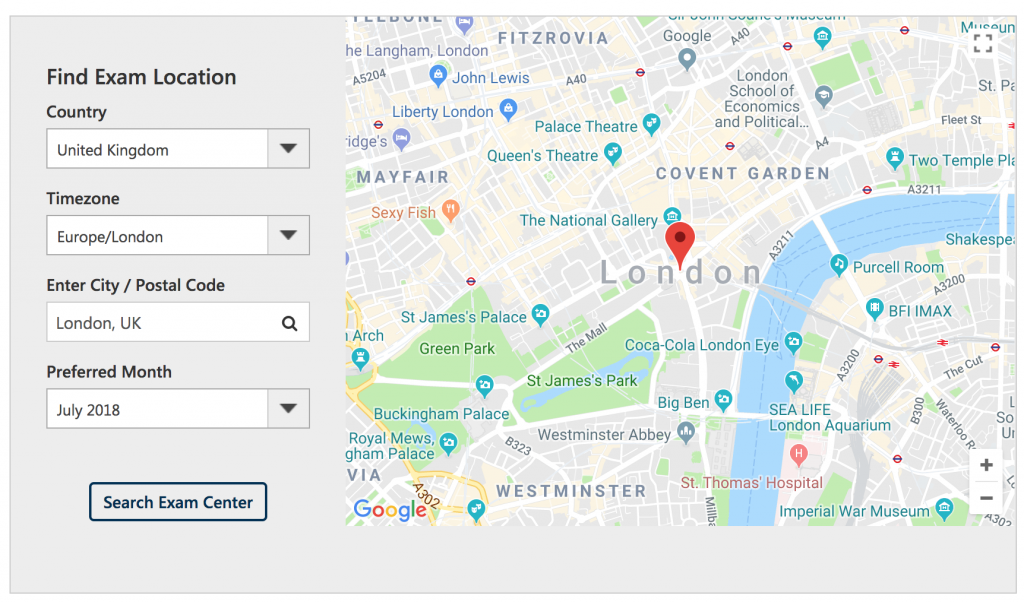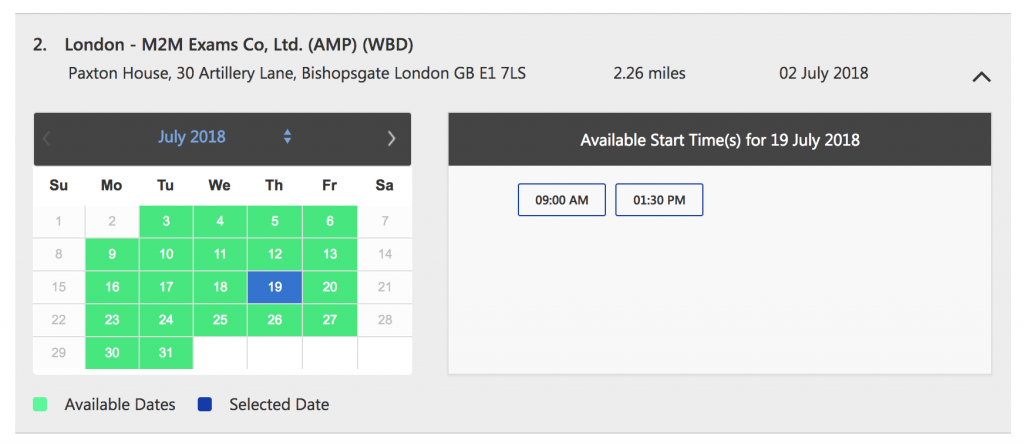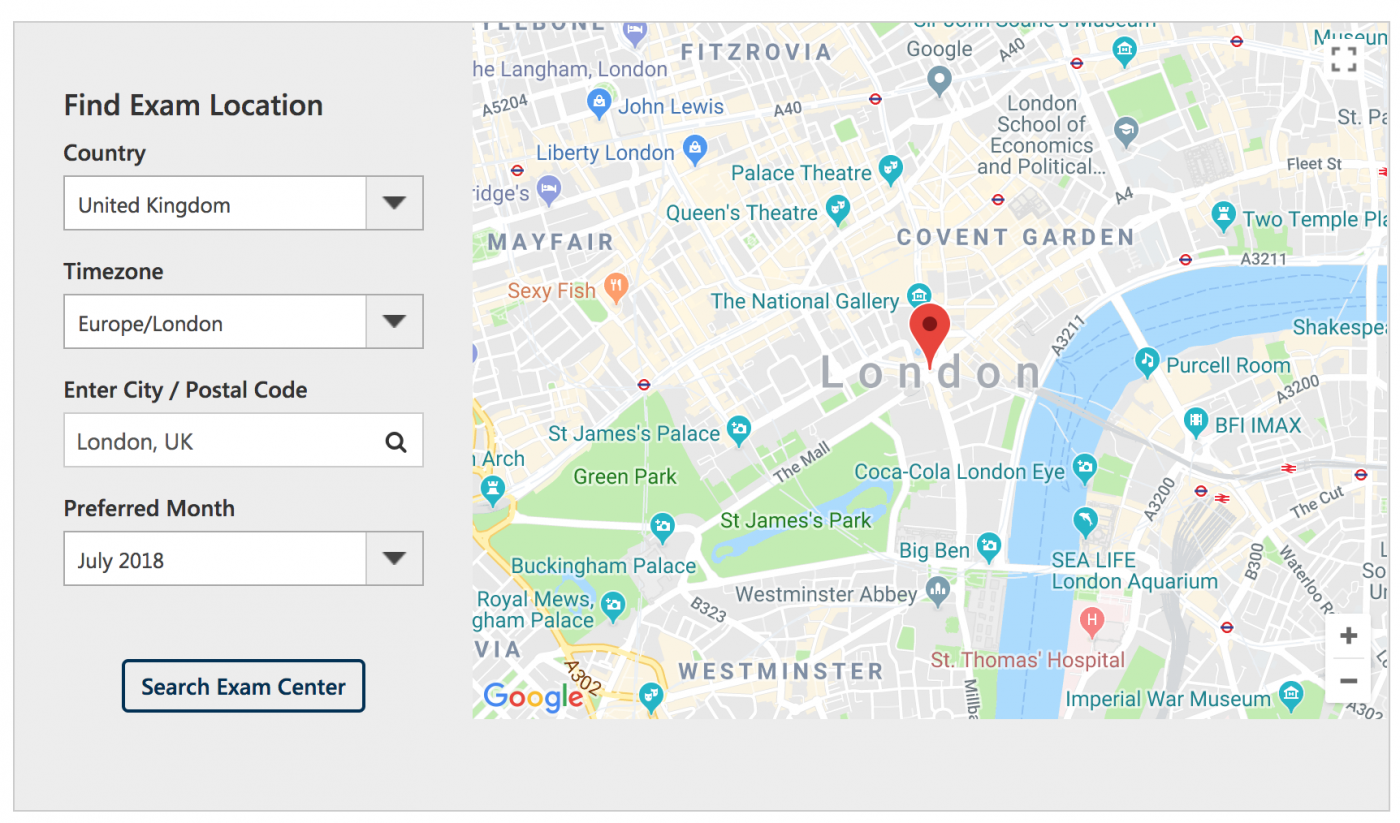What is the AWS Practitioner certification?
So, I’m no stranger to certifications. In my 12 years as a developer I’ve collected a bunch of them. And they help! My Java and Spring certs played no small part getting my first contract gig. I’ve found that having an industry recognized qualification can really cut through the “Can this guy do what his resume says he can” conundrum that every interviewer goes through. The AWS Practioner certification is no exception!
The Practioner exam is your entry point into the AWS certification world. Although it’s not a mandatory step and I’ll go into what the means a little deeper in the “Who is the exam for” section. It covers a broad range of topics including cloud concepts, security, technology, and billing and pricing.
After passing this exam you’ll have an understand of the core value proposition of AWS and cloud computing in general. You’ll understand the key features of AWS and what they can offer. The pricing structure of AWS services and how they compare to traditional data centers. Identify AWS products that can help solve your business needs.
Who is this exam for?
Taking the exam would benefit a broad range of people in the tech industry. This isn’t limited developers and architects. Business analysts, product owners, project managers etc.… would all benefit from the Practioner exam.
The exam falls at the base of the AWS certification tree and while it is not a prerequisite for taking some of the more advanced courses. It is required (although not if you have an associate certification already) to take the specialist exams such as the security, big data & advanced networking courses.

If you have set your sights on progressing through the AWS certifications then it might also make sense to “grab an easy one” early on with the Practioner as it would the learning curve for the architect Associate & developer associate is much steeper. Not to mention having 2 certifications on your resume just plane looks better than having one.
The last meta reason I would put forward is that when you go to take these exams there’s a lot of additional none exam content related this you have to take into account that might not be obviously initially and could potentially distract you on the day of the exam itself. I’m talking about things like travel arrangements for the test centers, processes you have to follow once you arrive, what not to take into the exam & what too take into the exam. All this adds up and you’d be kicking yourself if you studied hard for one of the more advanced certifications and you didn’t take into account the travel arrangements or you brought a phone into the exam room by accident.
It sounds obvious, but that’s sometimes where we slip up.
Why it matters
In the intro, I spoke a little about why certifications matter. And I’d like to dig a little deeper into this. When applying for a job, or perusing a promotion at work, there’s always the question of why we should hire this person, or what makes this person stand out from their colleagues. Our goal should be to make that question as easy and obvious as possible to answer, that it really becomes a “no brainer” for the hiring or promotion staff to consider.
Certifications are a step in the direction of making that question easier to answer. Where the Practioner exam stands out for me, is the broad range of people it can help move them closer towards their goals. Cloud computing and software as a service are the buzz words of our time and for good reason. The logistics of scaling a software solution gracefully up and down dependent on load and creating a fault tolerant architecture have been a headache the tech industry for as long as I can remember.
When you consider that getting this formula correct has a very real monetary cost associated with it. Both with in operational cost and lost revenue from service down time. You can quickly start to see why people other than tech staff would have a vested interest in the technology used to run their business. At the very least have some high-level knowledge of it so that an informed discuss can take place.
What’s in the exam
So now for the meat of it. What does the exam cover? And how much time is it going to take to learn this stuff?!
There’s a summary that gives you the main topics of the exam and I’ll expand on them slightly in this section of the blog. The first is
Define what the AWS Cloud is and the basic global infrastructure
AWS is split up into regions. Each region represents a physical geographic area. For instance, Frankfurt. At the time of writing this, there are 18 regions, however that number will grow (an up to date list can be found here) over time. These regions are then further broken down into availability zones allowing for multi-site disaster recovery amongst other things. The exam will test your knowledge of this and how to make best make use of the AWS’s global infrastructure.
Describe basic AWS Cloud architectural principles
This like gracefully scaling based on demand, automatic recovery from loss of resources, fault tolerance and deployment automation are covered here. Ideally you need to think of the servers themselves as throw away resources and promote lose coupling in your application structure. The exam may even briefly cover lambda (serverless architectures) and its benefits.
Describe the AWS Cloud value proposition
The AWS presentation slides (linked bellow) cover this concept in good detail. You can expect one of the main points they hammer home, is the fact that with AWS you only pay for what you use. This differs from say a traditional data centre when you hire equipment and pay for it whether you are using it or not.
Describe key services on the AWS platform and their common use cases (for example, compute and analytics)
You’re going to pick up some broad understanding of the core features of AWS and where they might come in use to solve typical IT infrastructure problems. S3 for exam is Amazons file storage mechanism and can scale virtually infinitely. EC2 is their virtual server hosting solution, RedShift is used for storing massive qualities of data for analysis at a later date, the list goes on.
Describe basic security and compliance aspects of the AWS platform and the shared security model
All these sub headings are worthy of articles in their own right and if you want a more in-depth analysis of a particular topic let me know in the comments. As for security, the exam will almost certainly test your knowledge of where the responsibilities of the shared security model fall. Spoiler alert, basically AWS manage the hardware infrastructure. While the account manager is responsible for things like network traffic protection and custom data.
Define the billing, account management, and pricing models
Understanding the cost structure of AWS is of the highest importance, especially if you’re the one writing the cheques. Luckily this topic is cover in the Practioner exam. Including TOC (Total Cost of Ownership) migration estimations and individual service pricing structures. It’s also interesting to point out that pricing can change between regions and availability zones. So, it’s worth keeping that in mind when deploying your software.
Identify sources of documentation or technical assistance (for example, whitepapers or support tickets)
This is an easy one to cover, I’ll link a few where you can find those white papers here. I’ve read a few of these and I’m dubious as to their relevance to the exam specifically. But they present a nicely summarized view of AWS. The one I would recommend reading is one.
Describe basic/core characteristics of deploying and operating in the AWS Cloud
This undoubtedly involves becoming familiar with the AWS management console and understanding how to navigate it. This may sound obvious, but they are adding new features and services all the time and knowing how to find what you want is going to make things a lot easier to manage. In addition to this, understanding the release cycle and how services are deployed and monitored when in production is vital for any enterprise system.
Resources to pass the exam
Now you have a reasonable understanding of what’s included in the exam, who would benefit from taking the exam and why it matters. You might be wondering, where can I learn the material to pass the exam. Don’t worry, no need to go googling around, I’ve put together that I think are the best sources of information to pass this exam and the more advanced ones in the future.
AWS Coach!
Ok, you knew this was coming. Yes, this is a shameless plug of AWSCoach.net. But in all honesty, the whole reason this site exists is to help people pass their AWS certifications. As the site grows, you’ll see more and more posts relating to all the exams offered by the AWS certification team.
Where we stand out from the rest is we’re in the same boat as you. We want to pass the exams and have been through or are going through exactly what you are. So the information you’ll find here is firsthand experience of studying and taking the exams. Best of all, it’s free!
To learn more about what AWS Coach can offer check out the start here page.
AWS Cloud Practioner essentials
This is where I started. AWS offer a free 7 hour digitally delivered course. It’s a good start and it’s great that AWS offer it for free. But I would say it will only get you started and I would highly recommend not rely solely on the information it provided. You can find and register for the Practioner essentials course on the aws training site.
ACloudGuru
This is my first, none free option. ACloudGuru have over 600,000 students enrolled in their courses. Myself being one of them. The guys over at ACloudGuru provide in my opinion the best paid courses for learning a variety of cloud platforms. Especially AWS. You can find their website as acloud.guru or you can purchase their courses through Udemy.
WhizLabs
This next one, I find is particularly useful. After you’ve read all the AWS coach articles and completed your acloudguru course, you’re ready to take the exam, right? Wrong! Do some…no…lots of practice exams. Live and breathe mock exams. Because at $100 per exam it’s not the cheapest to re-sit. WhizLabs has you covered. For a fairly reasonable price you can purchase 3 well put together practice exams that will get you in shape for the real one.
Revise a harder exam
This approach can have a number of advantages. For one, revising for say the architect associate will put you in good stead to take that exam following completion of the Practioner. And two, the questions in the Practioner by comparison will seem easy. This approach is certainly not the quickest. But putting the effort in and grinding out the revision sessions can ultimately prove useful. Especially if you don’t intend on stopping at this Practioner.
Booking the exam
You’ll need to create an account and log into the AWS training portal in order to book the exam. After doing so, you can enter your geographic location and the site will select a list of the closest venues to you and the time slot you wish to book. Please note that not every venue offers weekend bookings and in large cities the slots for exams can fill up due to the popularity of the course.


I passed, what do I do now?
Congratulations! You did it! Well if I were in your place (and I have been) then I’d recommend registering for the architect associate exam. It digs deeper into the world of AWS and you start to gain an appreciation of how to use it practically to solve your business needs.
Conclusion
Putting the time and effort into learning and passing certifications isn’t easy by any measure. But the hard work and dedication can pay off. In the context of the Practioner exam you’ll have a qualification that is red hot in the market today and will help you stand out from the rest when it comes to getting that dream job or the promotion you’ve been hankering over. So good luck guys and I would love to hear your stories about the Practioner exam and if you found this article useful in the comments below.
Want practice exam questions? I’m thinking of creating a set of free mock exam questions. If you guys are interests, let me know in the comments below.


Comments
Hello,
Thanks for your blog. It really appeals to me and seems very relevant to my plans.
I am a former Cisco Engineer who left IT for the Project Management for 10 years +
This proved to be a costly mistake. My peers have gone so far and regularly get lucrative contracts.
I am now desperate to get back to IT via the AWS route. I have no mentor and you blogg is my only guide.
How long due you recon I need for the associate and professional exams studying seriously daily?
Would it be possible to have a brief chat?
Tony
07958 281 664
Hi Tony
Glad to hear you’re thinking about heading down the AWS route. I’m planning on putting out lots more content about the exams over the next few months. My advice would be to sign up for one of the many courses available. I wrote an article discussing a few routes for learning AWS on the blog. Check it out here: https://awscoach.net/cost-certification/
Hi Stephen [and others],
After you took the Practitioner exam, did you get any kind of voucher/coupon/discount for taking the next level exam? I heard from someone else that he did. I was thinking of taking the Associate exam at some point but thought I’d start with the easier one to better ensure I get somewhere with less effort.
Thanks
Hi Rodney, thanks for the question.
I didn’t get any type of voucher for taking the next exams. Technically you don’t need to take the practitioner exam prior to taking an associate exam.
Steve